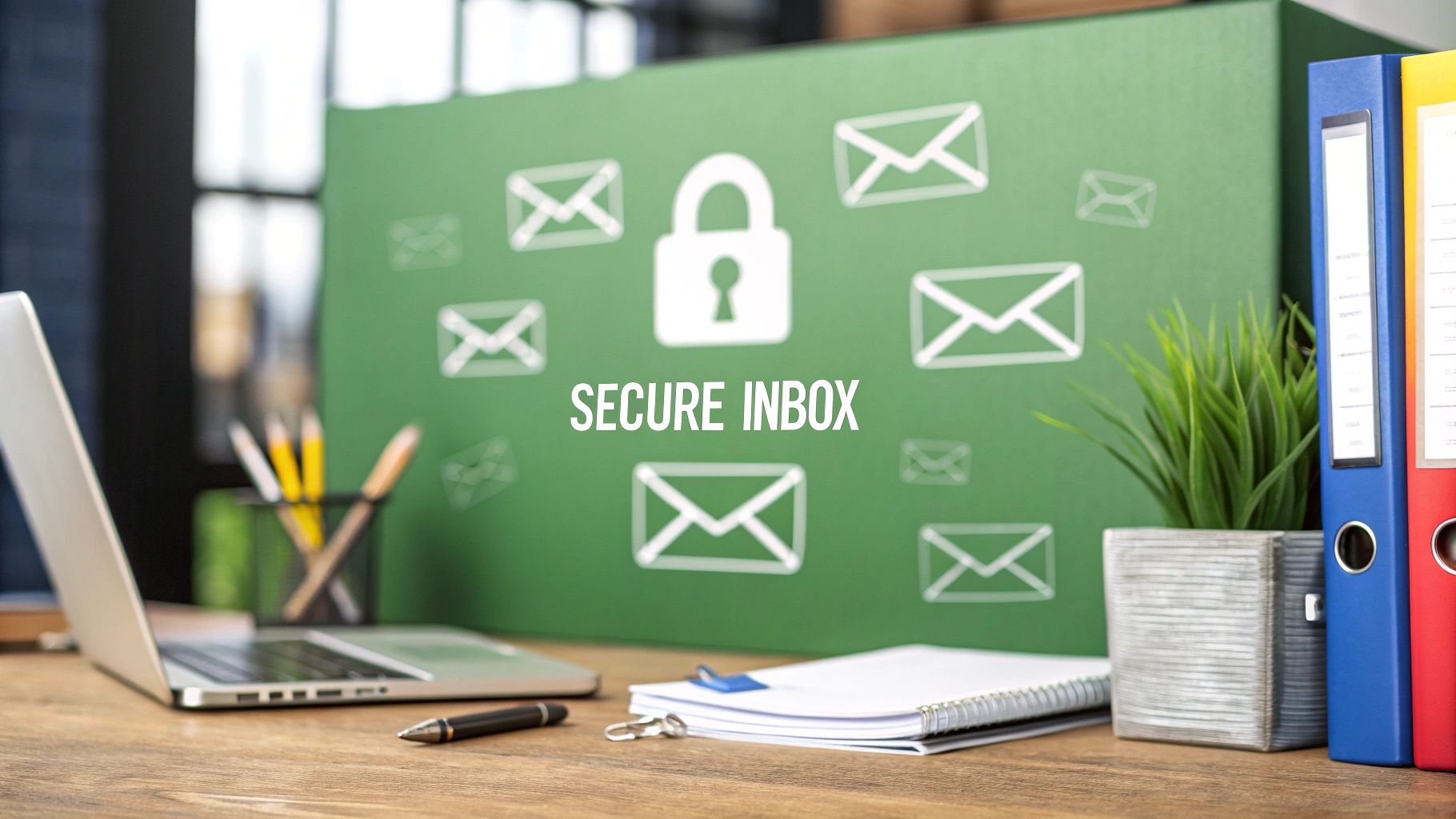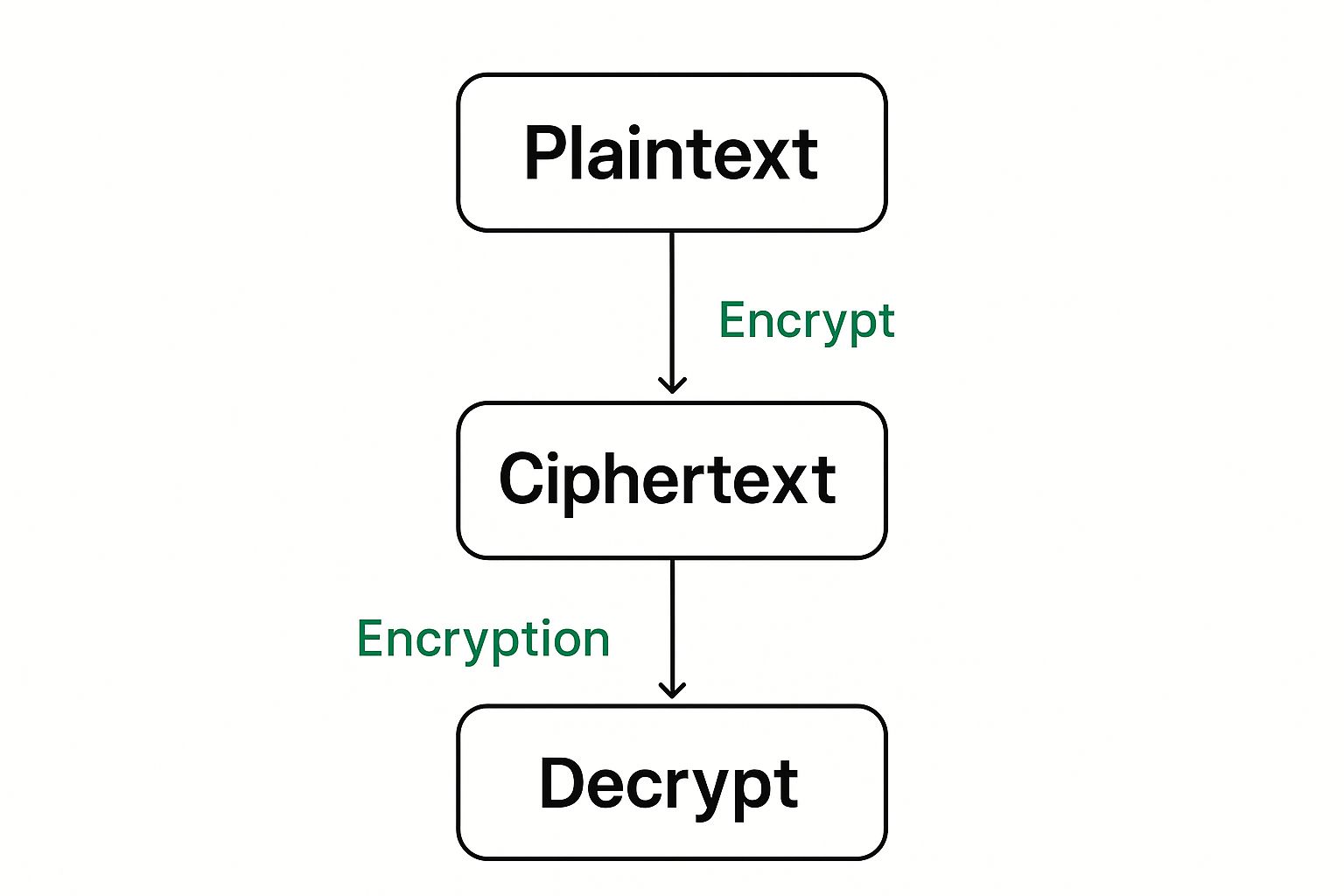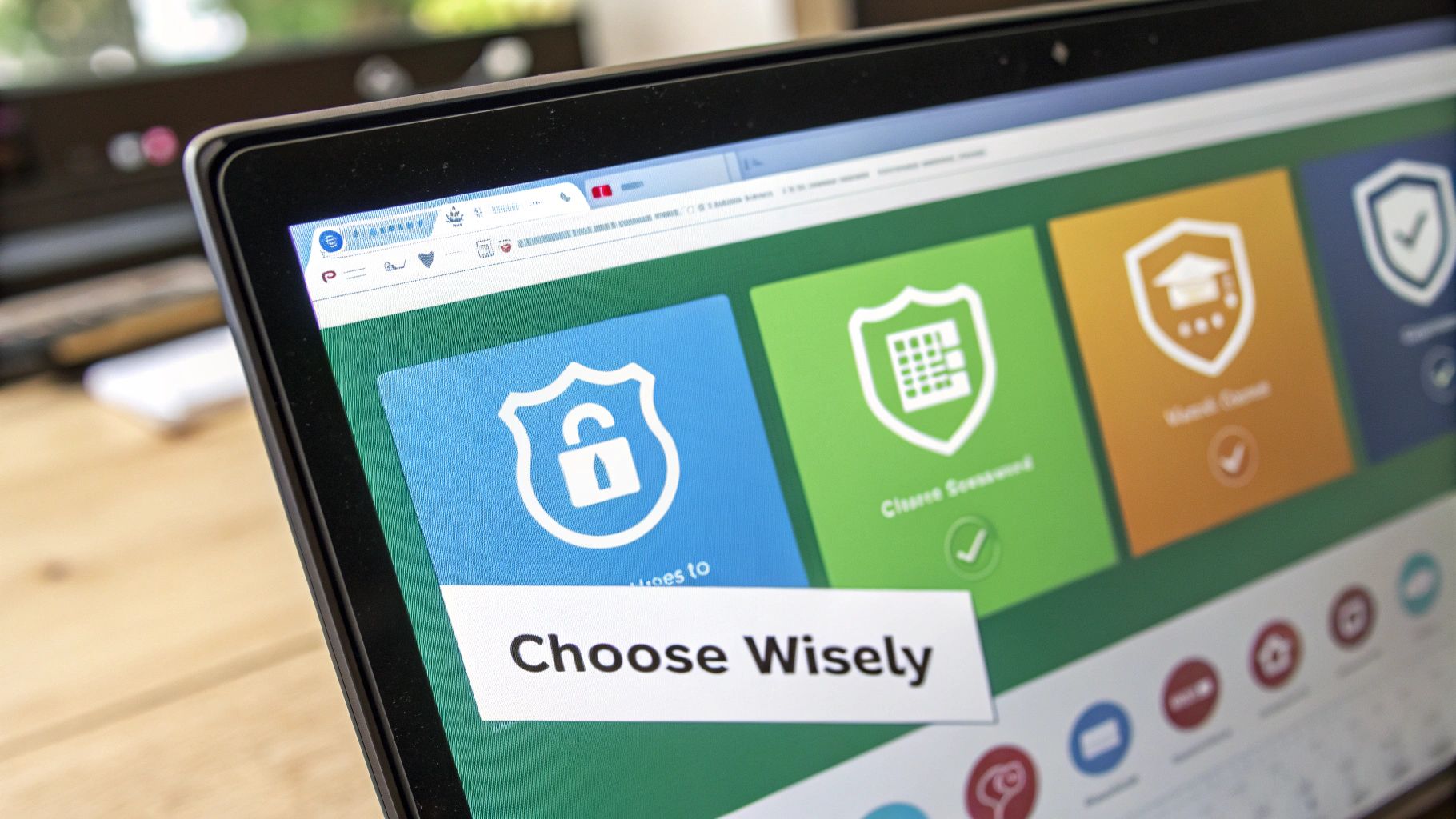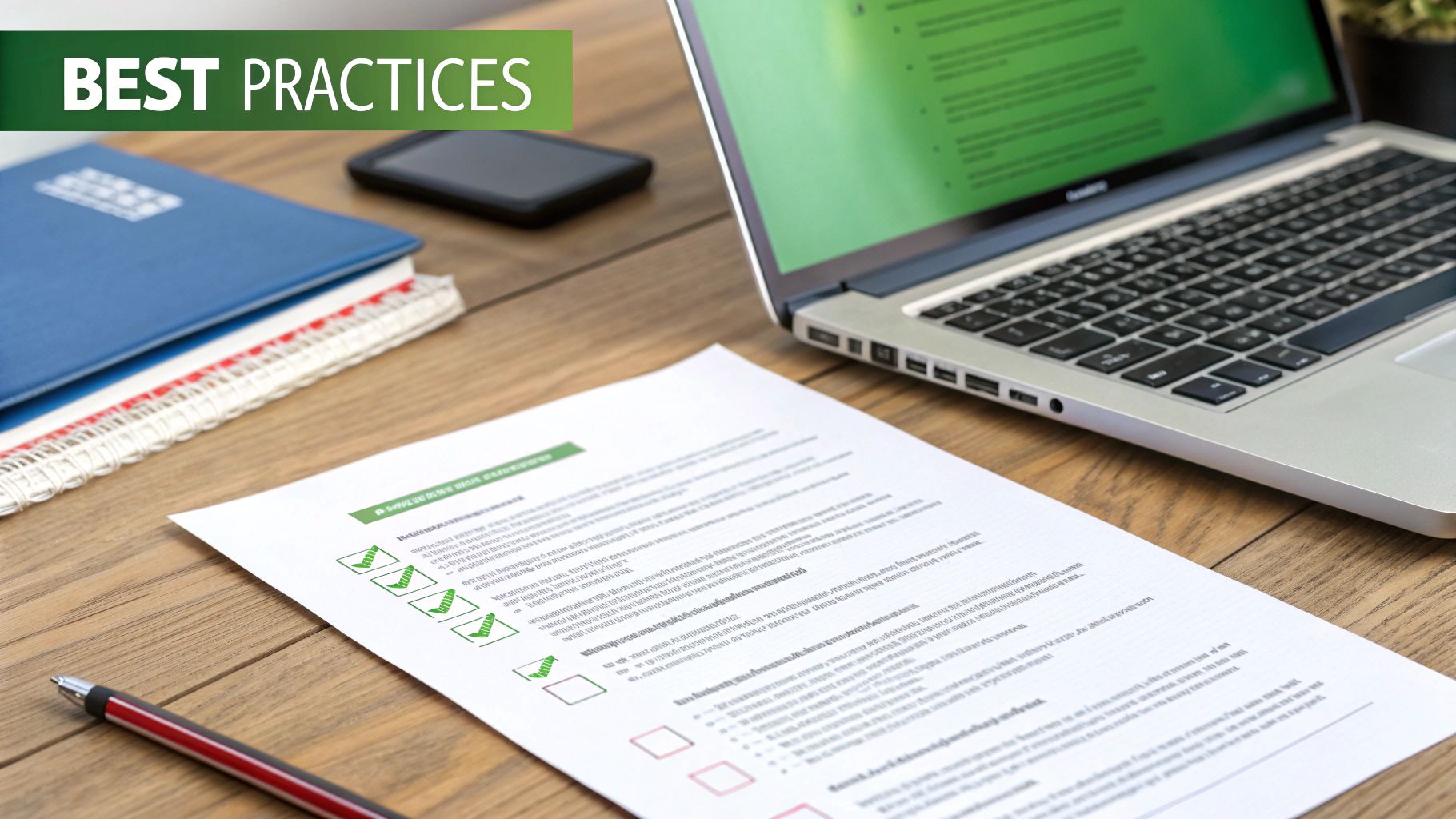Encrypted Email for Business: A Guide to Email Security and Privacy

Think about standard email like sending a postcard. Anyone who gets their hands on it along the way—from the mail carrier to a snooping third party—can read the entire message. Encrypted email for business is the digital equivalent of putting that postcard in a locked, tamper-proof safe before mailing it. It's a fundamental pillar of modern email security.
Only the person with the right key can open it. This isn't just a tech upgrade; it's a core strategy for ensuring email privacy and keeping your business communications secure.
Why Encrypted Email Is Now a Business Necessity
In a world where data is a primary asset, leaving your company's communications exposed is an unacceptable risk. A normal, unencrypted email travels across the internet in plain text, making it a prime target for interception. Every single message containing financial reports, private client details, or strategic plans becomes a potential email security nightmare.
Adopting encrypted communication, especially through a dedicated hosted email platform, is about building a digital fortress around your most important conversations. It ensures that what's meant to be private stays private, protecting your operations, your reputation, and your bottom line.

Protecting Your Most Valuable Digital Assets
Every company has information that would be devastating if it fell into the wrong hands. Encrypted email is your first line of defense. It locks down critical communications and guarantees the privacy of:
- Intellectual Property: Keeping your patents, trade secrets, and R&D projects safe from industrial espionage and unauthorized access.
- Financial Data: Ensuring invoices, bank details, and sensitive financial plans are unreadable to anyone but the intended recipient.
- Client Information: Guarding personally identifiable information (PII) and upholding the trust your customers place in your commitment to their privacy.
Without this layer of email security, you’re gambling with your company’s future every time an employee hits "send."
Meeting Strict Regulatory Demands
Data privacy isn't just a best practice—it's the law. Governments worldwide have implemented strict rules to protect consumer data, with severe penalties for non-compliance. A solid encrypted email platform is non-negotiable for staying on the right side of these legal frameworks.
A data breach isn't just an inconvenience; it's a financial disaster. The global average cost hit a staggering $4.45 million in 2023. Investing in strong email security like encryption isn't an expense; it's a critical step in managing risk and protecting your bottom line.
Hosted encrypted email solutions help businesses comply with regulations like GDPR in Europe and HIPAA in the United States. These laws mandate that organizations handling personal or health information must implement appropriate technical safeguards. A single privacy slip-up can lead to massive fines, legal battles, and a damaged reputation. To better understand the landscape, check out our complete guide to email security threats. A secure, hosted email platform shifts your posture from reactive to proactive and compliant.
How Email Encryption Actually Works
So, how does this all work in practice? The easiest way to think about email encryption is like a sophisticated, digital version of a lock and key. It’s a system designed from the ground up to guarantee that your private conversations remain private.
The entire concept hinges on public-key cryptography, which is simpler than it sounds.
Imagine you distribute identical, open padlocks to everyone you might communicate with. This is your public key. Anyone wanting to send you a secure message can take one of your padlocks, place their message in a box, and snap the lock shut.
Here's the crucial part: once that padlock is closed, it can only be opened by your unique private key, which you keep completely secret. This means anyone can send you a secure message, but you are the only person in the world who can actually read it. This is the foundation of true email privacy.
The journey from a readable message (plaintext) to a scrambled, unreadable one (ciphertext) is the core of this process, as you can see here:

This visual shows how an encryption key transforms your sensitive data into a secure format, making it completely useless without the matching key to unlock it.
Transport-Level vs. End-to-End Encryption
It's vital to understand that not all encryption is created equal. When discussing email security, you’ll encounter two main approaches: Transport Layer Security (TLS) and End-to-End Encryption (E2EE). The difference between them is massive, especially concerning privacy.
Think of TLS as a secure tunnel. When you send an email, TLS creates a protected path between your email server and the recipient's server. It’s effective at stopping snooping while the message is in transit. The problem? The email itself isn't locked. Once it arrives at a server, the provider (like Google or Microsoft) can access its contents, creating a significant privacy gap.
This has become the bare minimum for email security. By 2025, it's expected that around 93% of enterprises will encrypt data as it travels across their networks using methods like TLS.
While TLS is essential, it doesn't provide true confidentiality. The email provider holds the keys and can access your messages.
The Gold Standard for Email Privacy: End-to-End Encryption
This is where End-to-End Encryption (E2EE) changes the game entirely. It represents the highest level of email security and privacy available for digital communications.
Going back to our analogy, E2EE is like putting your message inside a locked safe before it even enters the secure tunnel. The message is scrambled on your device and can only be unscrambled on the recipient's device.
No one in the middle can read it. Not your internet provider, not the email server administrators, and not even a hacker who breaches the server. All they’ll see is a locked safe, and they don’t have the key.
This guarantees that your conversations are truly confidential, accessible only to you and the person you're communicating with. If you want to dig deeper, our guide answers the question: what is end-to-end encryption explained simply.
Choosing the right approach comes down to how much email privacy your business truly needs. Here’s a quick breakdown:
| Feature | Transport-Level Encryption (TLS) | End-to-End Encryption (E2EE) |
|---|---|---|
| Protection Scope | Secures the connection between servers (in-transit). | Secures the message from sender to recipient (at rest and in-transit). |
| Provider Access | Your email provider can read your messages on their servers. | Your email provider cannot read your messages. This is the core of email privacy. |
| Best For | Basic email security, protecting against casual network snooping. | Ultimate privacy for sensitive data, intellectual property, and regulated information. |
For any business serious about protecting its data and maintaining client trust, understanding this distinction is non-negotiable. While TLS is a necessary foundation, E2EE is the real fortress for your most confidential information.
The Strategic Benefits of Encrypting Business Email
So, we've covered the mechanics, but let's address the key business question: what's the return on investment? Implementing encrypted email for business isn't just an IT task. It’s a strategic decision that enhances email security, protects privacy, and builds trust. Think of it as investing in digital armor for your company's most vital information.
At the end of the day, encryption turns your email from a potential vulnerability into a fortified asset. It's the digital equivalent of locking the vault.

Fortify Your Data Security
In today's economy, data is currency. Every email can contain intellectual property, customer details, or financial plans. Leaving that data exposed is like leaving your office doors unlocked overnight.
Encryption is your best line of defense against numerous digital threats. Specifically, it protects you from:
- Business Email Compromise (BEC): Scammers often monitor unencrypted emails to learn internal processes, then impersonate an executive to trick employees into wiring money. Encryption makes this surveillance impossible.
- Data Interception: As your email travels across the internet, it's vulnerable. Without encryption, a hacker on the network can read your strategic plans or employee credentials.
- Unauthorized Access: If a server is hacked, end-to-end encryption ensures that thieves only get a mountain of unreadable, useless data, preserving your email privacy.
By locking down communications, you create a confidential channel for business, shielding your operations from costly disruptions.
Achieve Effortless Regulatory Compliance
Data privacy is not optional; it's a legal requirement. Regulations like Europe's GDPR, California's CCPA, and the healthcare-focused HIPAA have strict rules for handling sensitive information, and fines for non-compliance are severe.
Using a professional, hosted email platform with robust encryption is one of the most direct ways to meet these compliance obligations.
A strong encryption policy is more than just a way to avoid penalties. It’s proof of due diligence that demonstrates to regulators, auditors, and clients that you are serious about protecting their data privacy.
For example, a medical clinic using encrypted email to discuss patient details can confidently meet HIPAA's stringent security rules. A financial advisor can protect client portfolios, turning compliance from a constant worry into a solved problem.
Enhance Your Business Reputation and Client Trust
Trust is the bedrock of business. Clients and partners provide sensitive information expecting you to keep it safe. A single data breach can destroy that trust, damaging your brand and sending customers to competitors.
Making encrypted email a standard practice sends a powerful signal: you value email privacy and invest in protecting their information. This is a competitive differentiator.
Consider the impact:
- A law firm that guarantees all communication is end-to-end encrypted builds deeper trust with clients who demand absolute confidentiality.
- A tech startup sharing its roadmap with investors via a secure, hosted email platform demonstrates a level of professionalism that inspires confidence.
Ultimately, offering secure communication is an investment in your reputation. It reinforces your brand as reliable and trustworthy, forging stronger relationships with clients who know their privacy is truly safe with you.
How to Choose the Right Hosted Email Encryption Platform
Stepping into the world of hosted encrypted email platforms can feel overwhelming. With many options promising top-tier security, how do you find a solution that truly fits your business needs?
The key is to focus on core areas impacting your email security, your team's workflow, and your peace of mind. Choosing the right hosted email platform is about integrating a system that protects your business without creating roadblocks.

Prioritize End-to-End Encryption
This is the most critical feature. Look for true end-to-end encryption (E2EE). Many services mention encryption but only offer transport-level security (TLS), which protects email in transit but leaves it exposed on servers.
E2EE ensures the message is scrambled on the sender's device and can only be unscrambled by the recipient. No one in between—not even the email provider—can read the contents. When evaluating hosted email platforms, ask one direct question: "Can you read my emails?" If the answer is yes, they aren't offering genuine E2EE, which is essential for true email privacy.
Platforms like Typewire are built on a zero-access architecture, meaning they literally cannot access your data. This is crucial for businesses handling sensitive information, as it eliminates the risk of a breach at the provider level exposing your private communications.
Evaluate the User Experience
The most secure system is useless if it's too difficult for your team to use. A clunky interface is an email security risk, as employees will find workarounds, reverting to insecure methods and defeating the purpose of your investment.
Usability is a core component of security. The best hosted email platforms make sending an encrypted email as easy as a regular one. Look for:
- Seamless Integration: Does it work with the tools your team already uses, like Outlook or Gmail? A simple plugin is a good sign.
- Intuitive Recipient Experience: Your clients shouldn't have to jump through hoops. A simple, secure link to a web portal is the gold standard.
- Clear Interface: The platform should be clean and easy to navigate, requiring minimal training.
The goal is to make security the path of least resistance. When a platform is intuitive, employees use it consistently, making your email security policy a practical reality.
Confirm Certified Compliance and Data Jurisdiction
For any business in a regulated industry, this is non-negotiable. Your hosted email platform must demonstrate it meets standards like HIPAA for healthcare or GDPR for businesses handling EU citizen data.
Look for providers that are transparent about their certifications and willing to sign a Business Associate Agreement (BAA).
Also, ask where their servers are located. Data jurisdiction dictates which country's privacy laws your data falls under. A provider like Typewire, which operates on privately owned data centers in a country with robust privacy laws, adds another layer of protection. It ensures your data isn't subject to weaker privacy regulations, keeping your encrypted email for business truly private and secure.
Comparing Encrypted Email Solutions
Not all encryption solutions are created equal. They vary in user experience, management, and overall email security. This table breaks down the main approaches to show where a hosted platform fits.
| Feature | Plugin-Based (e.g., PGP) | Gateway Appliance | Hosted Platform (e.g., Typewire) |
|---|---|---|---|
| User Experience | Complex; requires manual key management and user training. | Mostly transparent to senders, but can be clunky for recipients. | Simple for both sender and recipient; often integrated with existing email clients. |
| Setup & Maintenance | High; individual setup required on each device. Key management is a major headache. | High; requires hardware/software installation, configuration, and ongoing IT maintenance. | Low; a cloud-based service with no hardware to manage. Fast and easy to deploy. |
| Recipient Accessibility | Difficult; recipient must also use a compatible PGP system. | Varies; often requires portal login or password exchange, which can be confusing. | Easy; recipients typically click a secure link to view the message in a browser. |
| Scalability | Poor; difficult to manage as the team grows. | Moderate; requires hardware upgrades and can become a network bottleneck. | Excellent; easily scales to accommodate any number of users without new hardware. |
| Compliance & Reporting | Limited; difficult to enforce policies or generate audit trails. | Good; offers centralized policy control and detailed reporting. | Strong; provides centralized administration, policy enforcement, and compliance reporting. |
| Cost | Low initial software cost, but high hidden costs in training and IT support. | High upfront investment in hardware/software, plus ongoing maintenance fees. | Predictable subscription-based model (SaaS) with no capital expenditure. |
While PGP plugins offer strong encryption, their complexity is impractical for most businesses. Gateways provide control but come with high costs. Hosted platforms like Typewire offer the best of both worlds: robust email security and privacy with the simplicity and scalability modern businesses demand.
Putting Your Email Security Policy into Action
A powerful hosted email platform is only half the battle. Real victory comes from pairing great technology with smart processes. An email security policy makes all the difference, turning your investment into a comprehensive defense strategy.
The goal is to move from simply having encryption to mastering it. This means building rules that make email security a natural part of everyone's workflow. A solid policy ensures everyone knows their role in protecting the company’s digital front door.
Defining What to Encrypt
First, you must define what kind of information always requires encryption. Ambiguity is the enemy of email security.
Start by identifying the data that would cause the most damage if exposed:
- Personally Identifiable Information (PII): Names, addresses, Social Security numbers, or driver's license details.
- Protected Health Information (PHI): Any patient data covered by HIPAA.
- Financial Data: Client credit card numbers, bank statements, internal financial reports, and payroll information.
- Intellectual Property (IP): Your trade secrets, product designs, proprietary code, and strategic plans demand the highest level of protection and privacy.
Think of your security policy as a playbook. It gives every team member clear instructions on how to handle sensitive information, removing guesswork and minimizing the risk of a costly mistake.
For a holistic view, integrate your email rules into a larger framework, often starting with a comprehensive network security assessment to identify other vulnerabilities.
Establishing Clear Procedures
Once you know what to protect, you need to define how to protect it. Your policy should outline simple, repeatable procedures for sending and receiving secure messages.
Your procedures should answer a few basic questions:
- How do I send an encrypted email? Provide a simple, step-by-step guide showing them how to use the encryption feature.
- What should I tell recipients? Advise employees to give clients a heads-up that they’ll be receiving a secure message, explaining how to open it. This prevents confusion.
- How do I handle sensitive data that arrives insecurely? Define a process, such as moving the email to a secure folder and informing the sender about your company's email security policy.
These guidelines ensure your security standards are applied consistently. For a head start, grab our email security policy template and adapt it to your business.
Empowering Your Team Through Training
A policy is just a document until you bring it to life with training. Your employees are your human firewall, and knowledge is their best defense. This should be an ongoing conversation about email security and privacy.
Focus your training on practical skills:
- Hands-On Platform Training: Show them how to use the hosted email platform. Let them practice sending and receiving encrypted messages.
- Threat Identification: Teach them to spot phishing attempts and social engineering scams.
- Understanding the "Why": When employees understand they are personally protecting client privacy and the company's reputation, they become more invested in following the rules.
By focusing on these three areas—defining data, creating procedures, and providing training—you can turn your security policy into a powerful, living defense.
The Future of Business Email Security and Privacy
Email is the unofficial archive for your company's most critical data, making its security a top-tier business priority. As cyberattacks grow more sophisticated and privacy laws get tougher, strong email encryption is no longer optional.
This is about getting ahead of tomorrow's threats. The market reflects this urgency. The U.S. market for end-to-end email encryption is projected to grow from USD 1.14 billion in 2024 to a staggering USD 12.54 billion by 2034. This growth is driven by regulations like HIPAA and GDPR demanding better data protection and privacy. For more, see this detailed end-to-end email encryption market analysis.
AI and Zero-Trust Architectures
The next evolution in email security is about smarter, more integrated defenses. We're already seeing artificial intelligence (AI) woven into hosted email platforms. AI algorithms are becoming incredibly effective at spotting sophisticated phishing emails, analyzing patterns, and flagging suspicious activity in real time.
Simultaneously, encrypted email is a cornerstone of zero-trust security architectures. The zero-trust model operates on the principle: "never trust, always verify."
In a zero-trust world, no one gets a free pass—not even users inside your network. Encrypted email is vital because it guarantees that even if your network is breached, the actual content of your messages remains locked down, preserving email privacy.
This approach builds a far more robust defense, where every communication is protected by default.
Preparing for a Secure Future
With remote work and cloud services as the new normal, the need for secure communication channels you control is more urgent than ever. Sticking with standard, unencrypted email is a gamble most businesses can no longer afford.
Adopting a strong encrypted email for business solution is a strategic move. It positions your organization to handle the next generation of cyber threats, ensures compliance, and builds trust with clients and partners. By making email security and privacy a priority today, you're not just protecting data; you're future-proofing your business.
Got Questions About Encrypted Email? We've Got Answers.
Stepping into the world of encrypted email can feel complex, but it doesn't have to be. Let's tackle the most common questions businesses have about email security and privacy.
Does My Business Really Need This?
If your team sends or receives anything you wouldn't want made public, the answer is yes. Standard email is insecure by design.
Encrypted email is essential for protecting client data, financial records, health information, and intellectual property. Beyond preventing a data breach, it's non-negotiable for meeting compliance standards like GDPR or HIPAA. Most importantly, it demonstrates to your clients that you take their email privacy seriously.
Is This Going to Be a Pain for My Employees to Use?
In the past, email encryption was a clunky, technical process. Modern hosted email platforms have changed that. They are designed for usability, not just for IT experts.
The best services integrate directly into email clients like Outlook or Gmail. Often, it's as simple as clicking an "Encrypt" button before sending.
The recipient experience is just as straightforward. They typically click a link to open a secure portal to read the message—no software or account creation needed. A good provider makes email security so easy that it becomes second nature.
Simplicity is the new standard in security. A platform that is easy to use is a platform that gets used consistently, turning your email security policy into a practical, everyday reality.
What's the Difference Between TLS and E2EE, Anyway?
This is a critical distinction for understanding email security and privacy.
-
Transport Layer Security (TLS): Think of this as an armored truck driving mail between post offices (servers). The truck is secure, but once the mail arrives, the post office staff can read it. TLS protects data in transit but doesn't guarantee privacy on the server.
-
End-to-End Encryption (E2EE): This is like sealing your letter in a locked box before it leaves your hands. Only the recipient has the key. Neither the armored truck driver nor the post office staff can peek inside.
For true confidentiality and email privacy, E2EE is the gold standard. It guarantees that no one—not even your hosted email platform—can access your message content. It's the only way to ensure your communications remain completely private from sender to recipient.
Ready to secure your business communications with an email platform that prioritizes privacy, security, and ease of use? Typewire offers true end-to-end encryption with a simple, intuitive interface, all hosted on private servers to guarantee data sovereignty. Start your free trial today and experience the peace of mind that comes with truly private email.
Encrypted Email for Business: A Guide to Email Security and Privacy
Posted: 2025-09-24
Professional Email Addresses: Your First Line of Defense for Trust and Security
Posted: 2026-02-21
How Do I Block Gmail and Reclaim Your Inbox Privacy
Posted: 2026-02-17
7 Top Canadian Tech Companies Leading in Privacy and Security for 2026
Posted: 2026-02-13
Professional Email Greeting: Master the professional email greeting today
Posted: 2026-02-10
What is Email Phishing: Securing Your Inbox Against Digital Fraud
Posted: 2026-02-06
10 Email Retention Policy Best Practices for Security and Privacy in 2026
Posted: 2026-02-03
Top 12 Secure Alternatives to Gmail for Privacy in 2026
Posted: 2026-01-31
What Is Email Alias: A Guide to Better Email Security and Privacy
Posted: 2026-01-27